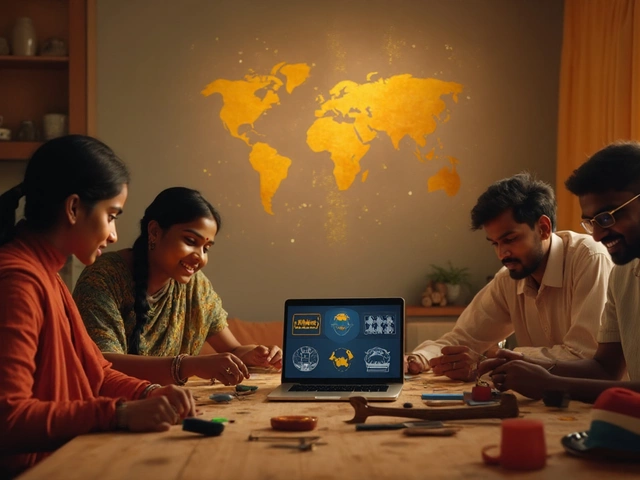Fifty isn't what it used to be. The idea that learning new skills stops at a certain age is getting old—fast. If you're 50 and thinking about picking up coding, you're actually right on trend. According to LinkedIn’s 2024 workforce survey, people over 45 made up nearly twenty percent of new tech bootcamp students last year. Employers are starting to see real value in life experience, not just a diploma or a fresh face.
Here’s the thing about coding: you don’t need to be a math genius or a tech whiz. You need patience, curiosity, and a bit of stubbornness. Most people who give up don’t fail because of age—they quit because they feel lost in jargon or get frustrated with bugs. If you can tinker, learn, and shrug off a few mistakes, you’re already ahead of the game. Plus, mature learners are known for grit—a big edge when the going gets tough.
And coding classes aren’t all one-size-fits-all. There are beginner-friendly courses with live mentors, small groups, and even programs just for older adults. Whether you're aiming for full-time work, a hobby project, or just keeping your brain sharp, there’s a class for you. The resources are out there—sometimes it’s just about picking the ones that match your pace and style.
- Why Older Adults Are Picking Up Coding
- Common Roadblocks and How to Tackle Them
- Choosing the Right Coding Language and Class
- Success Stories That Will Change How You Think
- Top Practical Tips for Learning to Code at 50
- What the Future Looks Like for Late Starters
Why Older Adults Are Picking Up Coding
If you think coding is just for teenagers in hoodies, think again. More and more folks over 50 are enrolling in coding classes and, honestly, they're changing what a tech career looks like. One big reason is job security. According to a 2024 CompTIA report, almost 35% of workers aged 50-65 say they worry about staying relevant as workplaces get more digital. Learning to code gives them a ticket to industries that are still hiring and paying well.
Some people jump in because they're sick of being left out by technology or want more control over gadgets, websites, or even their finances. Others are looking for a career change—something meaningful, flexible, or just less stressful than their last job. And for a bunch of retirees, it’s about keeping the mind sharp while picking up a practical new hobby.
A growing trend is small businesses using programming skills to automate boring tasks. Brenda, who runs a bakery in Michigan, took an intro to Python class in 2023 so she could set up inventory alerts. Now, she spends more time baking and less time counting flour bags. That's just one real-world win.
If numbers speak to you, check out this table:
| Age Group | % of US Coding Bootcamp Enrollees (2024) |
|---|---|
| 18-29 | 61% |
| 30-44 | 19% |
| 45-59 | 15% |
| 60+ | 5% |
While younger students are still the majority, that 20% chunk for over-45s isn’t small. And it’s getting bigger each year.
The internet is packed with resources, but what pulls older adults in often comes down to three motivators:
- They want to stay relevant at work.
- They crave flexibility and better hours.
- They're curious and enjoy the challenge.
So, if you're wondering about coding after 50, you're already on the same page as thousands of others who are deciding it's never too late for a new skill.
Common Roadblocks and How to Tackle Them
If you’re over 50 and just getting started, you’re probably running into some familiar roadblocks. These have nothing to do with being too old—they’re things almost everyone faces, just with a few extra twists for adults. Here are the big ones and what actually helps.
- Feeling Out of Place: Plenty of folks feel like coding is for young people. But younger students don’t have a magic gene for tech. It’s just exposure. The real trick is to ignore the age gap. Join online forums or local coding meetups—a lot of them have no age focus at all.
- Not Getting the Lingo: Tech words can sound like a different language. Instead of getting lost, use cheat sheets or flashcards. Websites like Codecademy and FreeCodeCamp keep explanations simple and let you revisit lessons as often as you want.
- Worrying About Memory: Remembering all the details—syntax, shortcuts, commands—can seem brutal. But nobody actually memorizes it all. Even professional developers Google stuff every day. The important thing is to know how to find answers fast.
- Time Crunch: Juggling work, family, or life in general? Adult students often study in short bursts. Try blocking off just 30 minutes a day, instead of hoping for a big stretch of free time. Consistency adds up way more than cramming once a week.
- Fear of Failure: A lot of adults feel pressure to get it right the first time. But coding is about breaking stuff and fixing it. Everyone hits bugs and gets stuck. Treat these moments like puzzles, not personal setbacks.
Let’s look at how other learners handle these struggles. Check out some numbers from a 2023 survey by Stack Overflow:
| Challenge | % Reporting Issue (Age 50+) | Common Solutions |
|---|---|---|
| Technical Jargon | 61% | Glossaries, video explainers |
| Lack of Time | 54% | Microlearning, short daily practice |
| Getting Stuck on Problems | 47% | Online forums, peer support |
| Doubting Ability | 39% | Success stories, mentorship |
If you’re eyeing coding after 50, the best thing to do is focus on real challenges—not the idea that you’re "too old." Find what fits your schedule, use communities for support, and remember: nobody’s keeping score but you.
Choosing the Right Coding Language and Class
This is where a lot of beginners trip up: picking the wrong language for their goals. There’s no "perfect" language, but some are easier for newcomers, especially if you’re jumping in after 50. Let’s talk about the most popular ones—and what they’re actually used for.
- Python: This is the go-to for many. It’s readable, simple, and used everywhere from websites to data science. In 2024, Stack Overflow’s Developer Survey ranked Python #1 for beginners.
- JavaScript: If you want to build websites, this is the ticket. Nearly every webpage uses it in some way.
- Ruby: Also very beginner-friendly. Aimed at making coding feel natural, with lots of online tutorials.
- SQL: Great if you’re interested in working with databases or business data. Not as intimidating as it sounds.
Of course, what you choose depends on your goals. Ask yourself if you want to make a website, analyze data, automate tasks, or maybe develop games. Picking a language that matches your interest helps keep motivation up—especially in the first few months.
| Language | Best For | Beginner Friendly | Jobs (2024) |
|---|---|---|---|
| Python | Web, Data, Automation | Yes | 270,000+ |
| JavaScript | Websites, Apps | Yes | 180,000+ |
| Ruby | Web Apps | Yes | 25,000+ |
| SQL | Data Analysis | Yes | 220,000+ |
When you start searching for coding after 50 classes, keep these features in mind:
- Pacing: Look for programs you can do part-time, self-paced, or that let you review lessons again and again. Cramming is for college kids.
- Live Support: Courses with mentors or live help can save hours of googling and frustration. Online bootcamps like freeCodeCamp, Codecademy, and Coursera have real humans answering questions.
- Community: Check if there are forums, local meetups, or chat groups for adult learners. The feeling of "everyone else is younger than me" is common—but less so if you join the right class. Some bootcamps even focus on older adults.
- Project-Based Learning: Pick a class that teaches by building things you actually care about. Making a simple website, a budget tracker, even a little game—watching projects come together is a huge boost.
Finally, don’t be afraid to test-drive a few free options before you shell out for a paid course. Many people over 50 try a couple online classes just to see what clicks. The learning curve is real, but getting started the right way makes it way less steep.

Success Stories That Will Change How You Think
If you think tech jobs are just for twenty-year-olds with computer science degrees, check this out. Barbara Oakley, now well-known for co-creating the online course "Learning How to Learn," didn't start coding until she was 40. She was once a waitress and even hated math in school. Today, her coding and data science skills help thousands of students worldwide, proof that it’s not too late to learn and thrive in this space.
Then there’s Mark Rebilas, a former professional photographer who tried coding at age 52 after his business slowed down during the pandemic. Mark joined a coding bootcamp meant for mid-career changers, and within a year, he landed a remote web developer position with a sports analytics startup. He credits his success to peer support in his cohort and picking project topics he cared about—like building a portfolio website for other photographers.
Let’s not forget Meetup’s 2023 story about their oldest coding bootcamp graduate, Gloria, who started learning at 61. She used to work in bookkeeping but wanted something new and challenging. Gloria built a budgeting app for senior citizens and presented it to a community of tech leaders. She’s now consulting for nonprofits, combining her coding skills and financial background.
- Barbara Oakley started over at 40, now a best-selling author and educator.
- Mark Rebilas made the jump from photographer to paid web developer at 52.
- Gloria became a tech consultant for nonprofits at 61.
Across these true stories, one thread stands out—none of them were child prodigies or math geniuses. They learned coding later in life, relied on real-world experience, and picked projects they cared about. If you’re searching for info on coding after 50, these examples prove it’s not just possible—it’s happening right now. There’s no rigid timeline in tech, only a willingness to roll up your sleeves and start.
Top Practical Tips for Learning to Code at 50
Picking up coding after fifty might feel overwhelming at first, but the real game-changer is how you practice. Older beginners bring patience and real-world skills. Add a solid plan and you’ll cut through that "where do I start?" fog fast. Here’s what actually works:
- coding after 50 isn’t about speed. Focus on consistency. Even 25 minutes a day trumps a random 2-hour sprint. The brain builds muscle memory with short, steady reps.
- Choose one language to begin with—like Python, which is clear, beginner-friendly, and used everywhere from web dev to data analysis. Most bootcamps for older adults recommend starting with Python or JavaScript because of their simple syntax and active communities.
- Find an accountability buddy or join an online group. According to CodeNewbie’s recent data, learners over 40 who join study groups are 42% more likely to stick with it for a year.
- Don’t try to memorize everything. Google, Stack Overflow, and ChatGPT are your sidekicks. The trick isn’t remembering, it’s learning how to search for the solution.
- Work on real projects from the start. It could be a family website or a simple budget tracker. You’ll understand why you’re learning and see results faster. Real projects build confidence way quicker than endless theory.
Here’s a snapshot of recommended habits and their impact for beginners over 50, based on a 2023 survey by FreeCodeCamp:
| Habit | Perc. Reporting Success (%) |
|---|---|
| Daily Short Sessions | 73 |
| Active Peer Support | 64 |
| Project-Based Learning | 71 |
| Online Tutorials | 59 |
| Printed Books Only | 21 |
Don’t sweat it if you run into stuff you don’t get right away. Mix up your learning—video, reading, hands-on practice—to keep things fresh. You’re not alone, and your background might even help you spot solutions that younger folks miss. Coding after 50 isn’t just possible—lots of people are figuring out it’s the perfect time to jump in.
What the Future Looks Like for Late Starters
If you’re picking up coding after 50, you’re not stuck playing catch-up. Tech is shifting in a way that actually favors more seasoned workers. By 2030, the U.S. Bureau of Labor Statistics expects jobs in software development to keep growing by nearly 25%. And companies have noticed that teams with age diversity just work better—they communicate more, have fewer project failures, and solve practical problems faster.
Let’s talk paychecks for a second. A 2023 report from Course Report found that adult bootcamp grads—folks over 45 with no prior experience—average a starting salary bump of $21,200 after six months in their first tech job. That’s not just pocket change. And remote work? It’s huge for older adults, letting you skip the commute and balance learning code with other priorities.
The coding after 50 trend isn’t slowing down. Here are a few things to expect down the road:
- More part-time, flexible tech jobs designed for people changing careers or easing into retirement.
- Communities and mentorship groups focused on older beginners, which means more support and less feeling out of place.
- Companies investing in retraining older staff, since it’s cheaper than hiring new grads for every technology shift.
Here’s a quick look at how adult coding students stack up in a few key areas compared to younger beginners:
| Area | Adults (45+) | Younger Learners (18-30) |
|---|---|---|
| Completion rate (bootcamps) | 93% | 85% |
| Average job offer (within 6 months) | 67% | 71% |
| Self-reported confidence | High after 12 weeks | Lower, longer ramp up |
Older coders might need a bit more time in the beginning, but finish strong and often stick with it longer. With tech changing so fast, everyone needs to keep learning, no matter the age. So really, you’re never too late—just right on time for what’s next.






Write a comment: